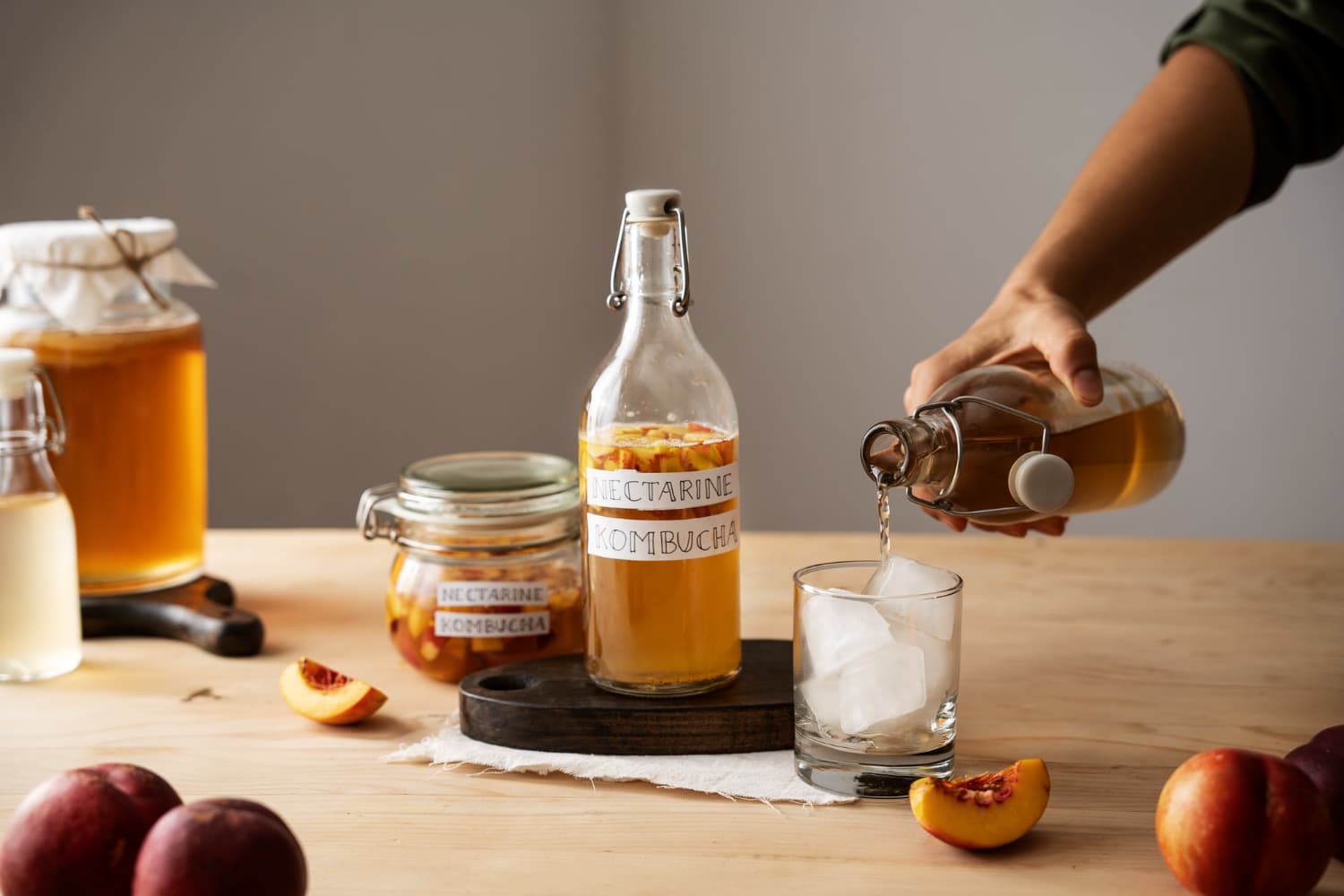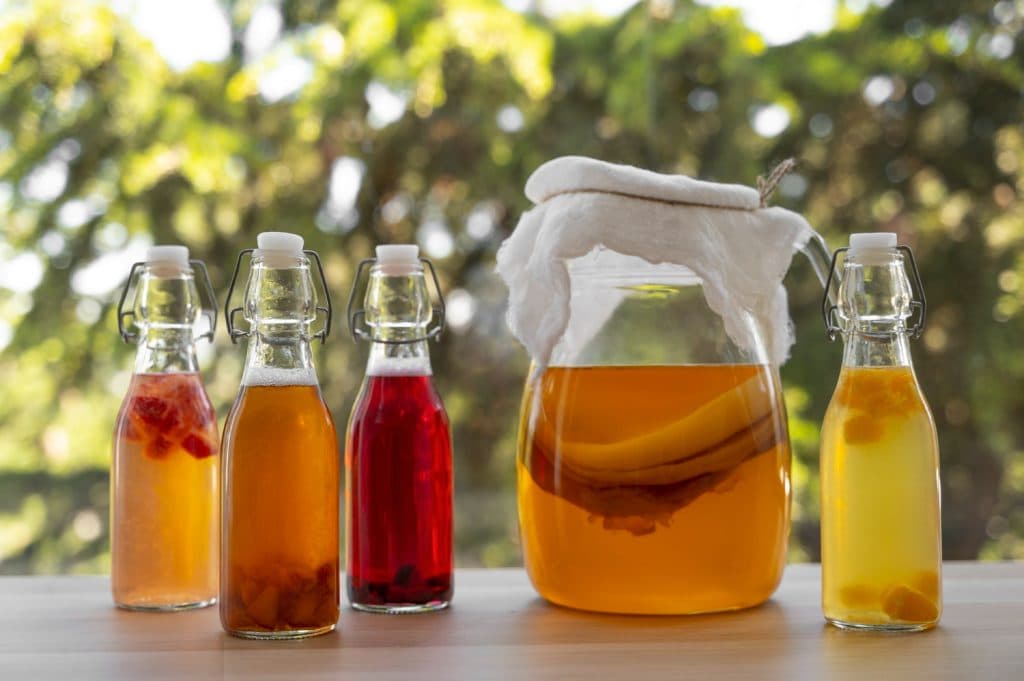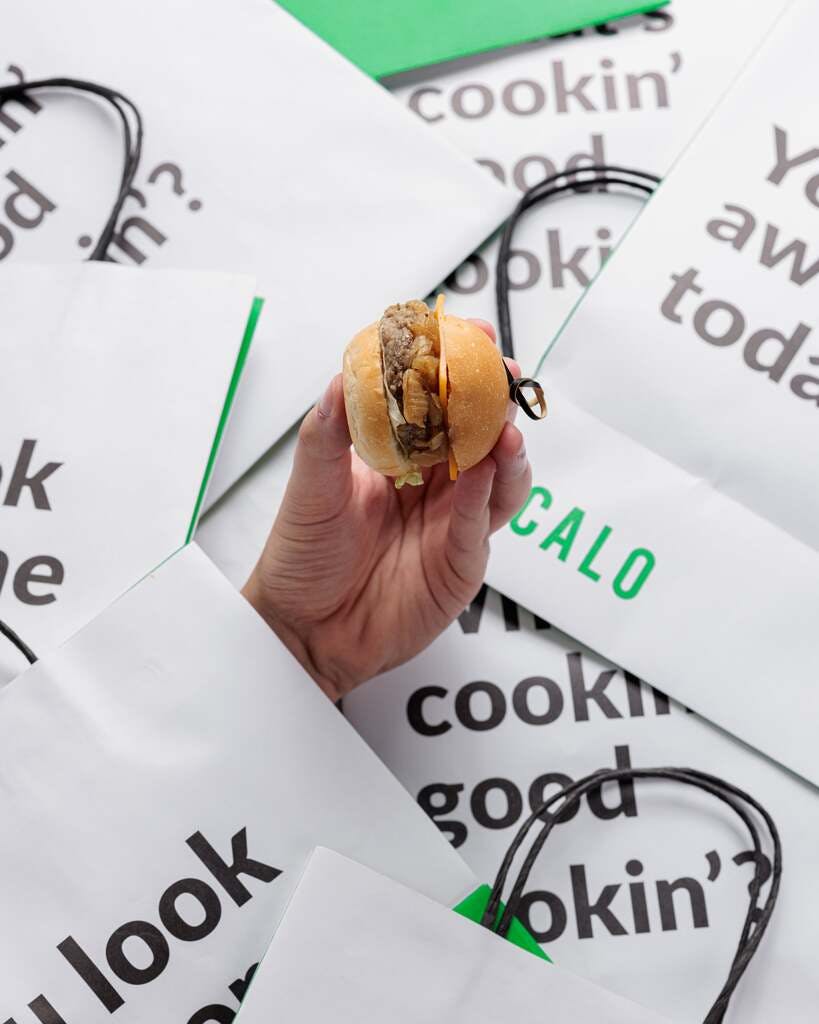Back to blog
What Is Kombucha Tea Good For? See Why This Ancient Drink Is Still Trending

What is kombucha tea good for and is it for everyone? Once known as “The Tea of Immortality," kombucha is an ancient fermented drink that originated in China, where it has been recognized for its health benefits for thousands of years. Now, it can be found in supermarkets and health food stores all around the world.
Kombucha is made by mixing together black or green tea with sugar, yeast, and specific strains of bacteria, then allowing it to ferment for about a week. This fizzy drink is particularly valued for its gut health benefits, as it is naturally rich in probiotics. In this article, we will discuss the benefits and potential drawbacks of Kombucha tea while showing you how to make this healthy soda alternative at home.
What is Kombucha Tea Good For Health-Wise?
Kombucha tea benefits have stood the test of time, and now it’s time for you to enjoy them. Let’s dive into the details:
Source of Probiotics
Most fermented products are high in probiotics, and that includes kombucha. Probiotics consist of live microorganisms and “good” bacteria that help restore a healthy balance to the gut. Drinking kombucha tea regularly can help promote a healthy digestive system and fight against constipation, diarrhea, and bloating.
Fights Inflammation
Kombucha tea is antioxidant-rich and polyphenol-rich, boosting immunity and fighting against inflammation; the root cause of many diseases, and so adding this tea to your daily routine can help in disease prevention and keep your body’s inflammation response in check.
Lowers Blood Sugar Levels
For those who struggle with diabetes or insulin resistance, kombucha can be a powerful ally in helping reduce blood sugar spikes. Glucose levels have been seen to decrease in those who regularly add kombucha tea to their daily routine. This may be especially true when consumed alongside a heavy carb meal.
Helps Improve Insulin Sensitivity
Kombucha tea gives a vinegar-like taste due to its content of acetic acid, known to improve insulin sensitivity, by slowing down carbohydrate digestion and so lowering blood sugar levels, particularly if consumed before or alongside high-carb meals.
Learn more about low carb diets.
Helps Promote Weight Loss
Due to its benefits in reducing blood sugar and improving insulin sensitivity, as well as replacing sugary soda drinks, kombucha may aid in weight loss when used alongside a healthy balanced diet.
Healthy Soda Replacement
For those who enjoy a fizzy carbonated drink with their meals, or after, kombucha couldn’t be a healthier replacement. Low in sugar and calories, it can help you replace a bad soda habit with a healthier, gut friendly replacement.
You can read more about sparkling water benefits and downsides.
Risks and Potential Concerns

While it offers many health benefits, there are some kombucha tea dangers and downsides you should be aware about, let’s explore them in detail:
Digestive Issues
Although Kombucha is known for its gut health reset benefits, some individuals may experience adverse after effects such as bloating, nausea, or stomach ache. Those with IBS may want to be particularly cautious, as kombucha is high in FODMAPs, which can trigger IBS symptoms.
May Harm Dental Health
Due to being high in acetic acid, when used in excess Kombucha may cause tooth erosion, rinsing your mouth after consumption can help reduce the impact of its acidity.
Not Advised for Pregnant Women and Children
Kombucha tea is not recommended for pregnant women or children, due to its low alcohol and caffeine content. There is also the potential of bacterial contamination in Kombucha, particularly if brewed at home, which could be unsafe for children and pregnancy.
May Contain Excess Sugar
Kombucha is generally low in sugar, however, a lot of store bought brands may increase added sugar to make the product more appealing. When buying it make sure to pay attention to its sugar content. Look for drinks that contain less than 4 grams of sugar per serving.
You can read more about healthy sugar alternatives.
Kombucha Tea Recipe

What is kombucha tea made of and how can you brew it at home? If you want to learn how to make kombucha at home, here is an easy recipe you can follow. To start off, you will need the following ingredients and steps:
Ingredients
- 8 cups (2 liters) of water.
- ½ cup of white sugar.
- 4 tea bags (black or green).
- 1 cup of plain store-bought kombucha (raw, unflavored)
- 1 glass jar (1-liter or bigger)
- Optional: a SCOBY (Symbiotic Culture Of Bacteria and Yeast) the “mother” kombucha.
Note: Thoroughly clean all tools and containers to prevent bacterial contamination.
Steps
Brewing the tea
- Boil 8 cups of water and stir in ½ cup of sugar
- Add 4 tea bags (black or green)
- Wait for water to cool down and remove tea bags
Add Kombucha and/or SCOBY
- Add the cooled tea into a clean jar
- Add a cup of store-bought plain kombucha (it’s important that it’s plain!)
- If you have a SCOBY, add it to the jar
- Cover the jar with a cloth and secure it with a rubber band.
Fermentation
- Let the mixture sit at room temperature for 7-10 days
- Taste the mixture on day 7, if it tastes vinegary and slightly acidic, then your kombucha has successfully fermented! If it is too sweet, wait for a few more days.
- If white or black spots appear, mould has unfortunately grown on your mixture. Please discard and try again.
Second fermentation
The second fermentation is the second time you make kombucha. It is slightly different from the first. Just make sure to save a bit of your first batch and repeat the process. Add some of the old kombucha with the new and this time you can experiment with all kinds of tastes and flavours, adding fruit and herbs. Some flavour ideas include:
- Peach
- Lavender and grape
- Lemon and ginger
This time you can also make kombucha by bottling it, adding carbonation and fizz. Just make sure you “burp” it (release pressure by removing the lid) once a day to avoid pressure build up.
Enjoy your DIY Kombucha! You now have an easy step-by-step guide on how to make kombucha tea at home from scratch. Make sure to keep everything as clean as possible for a safe, mold-free and contamination-free fermentation.
Healthy Meal Delivery
As with most healthy habits, its full impact is felt alongside a healthy diet. If you are ready to reap the full benefits of kombucha tea combined with a healthy meal plan now, just download the Calo App! Discover what it means to eat in the way your body truly deserves. You can choose a monthly subscription all made by our nutritional experts, just for you.
FAQs
Is kombucha tea alcoholic or not?
Kombucha contains trace amounts of alcohol (less than 0.5%), as it is a fermented drink. However, the percentage is so low that it is considered a nonalcoholic drink.
Is kombucha tea considered halal?
Yes, it is generally considered halal. Its alcohol content is not considered intoxicating and is understood as a by-product of fermentation.
Does kombucha tea have caffeine then?
Yes, kombucha contains caffeine as it is brewed with black tea or green tea. However, caffeine is significantly reduced during the fermentation process, typically under one-third of the original tea’s caffeine content.
Can you drink kombucha tea every day?
Yes, for most healthy adults with no immune issues, kombucha is fine to drink every day. However, it is best to still be mindful of consumption levels due to the caffeine and sugar content, as well as for its highly acidic nature.
So what is kombucha tea good for after all? It’s full of health benefits and delicious, this ancient tea was given the title the “Tea of Immortality” for a reason. Whether you are paying attention to your blood sugar, being gut health conscious or just looking for a soda replacement drink, kombucha might just be your top choice. Make sure to be mindful of its sugar content, especially when store bought, and follow instructions closely to avoid any contamination if you’re making it at home. Happy brewing! Learn more about Psyllium Husk Benefits, and learn about Gluten Intolerance, and many other health related topics on our Calo Blog.








